Use 8 Best E-commerce Platforms
- 12 August 2022
In the recent past, the popularity of online shopping has increased significantly compared to previous years. No wonder with this intensified interest i n online purchases, the number of e-sellers also multiplied. However, beginning e-commerce retailers may also find it difficult to choose the best platform that will meet their needs.
Among such fierce competition selecting the universal e-commerce engine is a hard nut to crack. That is why we collected the 8 best e-commerce platforms which we compared in terms of:
- pricing – from the platforms that are entirely free of charge, to those requiring a large budget,
- functionalities – from those ideals for beginners, to advanced business-oriented solutions,
- usage – considering both, beginner-friendly tools, as well as professional ones that often demand a developer’s support,
- inventory control – useful especially for professional retailers holding a large volume of assortment, and managing brick-and-mortar shops,
- omnichannel sales options – for those who’d like to scale their business.
The results of our analysis are presented below.
IdoSell – the most popular e-commerce platform in Poland
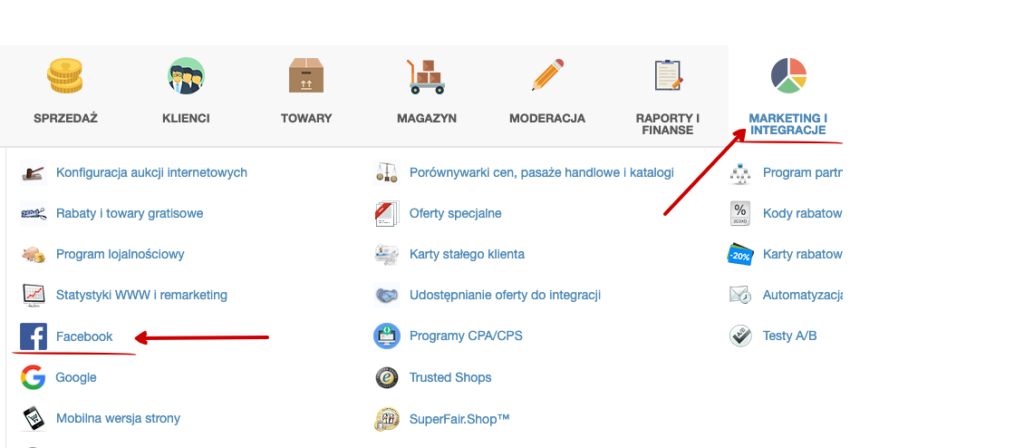
Idosell – most popular e-commerce platform in Poland, source: idosell.com
IdoSell is nothing else than a Saas ( Software as a Service) platform that conquered the Polish e-commerce market. It’s a useful tool for both, small e-sellers, as well as professional B2B clients that offer a wide range of products. Apart from its proprietary system and servers of its own, IdoSell also offers the clients full technical support, including professional developers’ assistance.
What stands out IdoSell from the competition are plenty of helpful features and its completeness, not to mention the One-Page Shop function (perfect for a small e-shop) and uncomplicated international trade services (a must-have when it comes to developed enterprises and wholesales).
The costs start from $99 (activation fee) plus a subscription fee ($12$- $599).
Pros:
- easy integrations with banks, price comparison websites, and auction services,
- multichannel sales options (Amazon, Facebook, Allegro),
- full technical support for the platform users.
Cons:
- complicated admin panel,
- some features may be customized by IdoSell developers only which may involve additional costs.
Shops examples:
- Sneakers Studio – https://sneakerstudio.pl/.
- Yerba Market – https://www.yerbamarket.com/ .
- Malama – https://www.malama.pl/ .
- Goodlookin – https://goodlookin.pl/ .

Idosell is fully integrated with Dealavo, so you can easily use our dynamic prices (repricing) services according to the price rules you choose. You can set them in our app – based on your competitors’ prices.
WooCommerce – WordPress perfect match
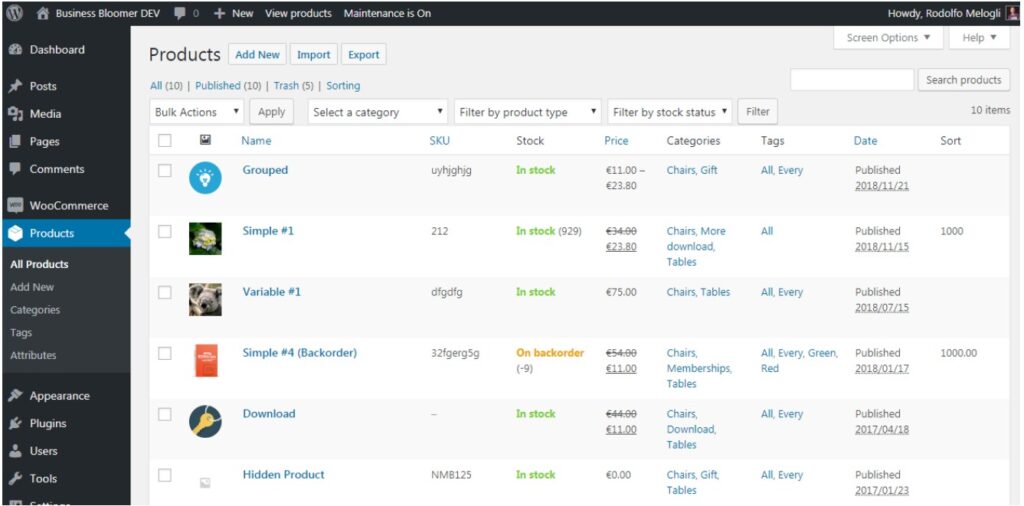
WooCommerce – WordPress e-commerce platform, source: www.businessbloomer.com
Probably there is no need to introduce WooCommerce to anyone. It’s a plug-in dedicated to WordPress users that enables them to plug an online shop into their website in an easy manner and completely free of charge. No wonder, WooCommerce became one of the most popular services, both in Poland, and worldwide, and up to this day, it provides services for about 30% of online shops on the market.
Users have access to dozens of templates and features that may be free of charge or chargeable, depending on their functionalities. The admin panel seems quite intuitive and for sure will not cause any problems for those who use WordPress on a daily basis.
WooCommerce is a perfect solution for small and medium-sized enterprises. However, for professional retailers who offer a wide variety of products and want to grow their business, WooCommerce may not be the best choice.
Pros:
- free WordPress plug-in,
- user-friendly,
- easy integrations with other platforms (Allegro, Amazon), post services (inPost, Poczta Polska), and online payment providers (TPay, PayU, Przelewy24, PayPal),
- SEO support.
Cons:
- no full technical support – live chat or e-mail only,
- bug-prone (the more additional plugins installed, the more difficult and slower shop management becomes),
- no hosting option is provided. However, you can use WPX WooCommerce Hosting which is one of the fastest WordPress hosting providers.
Shops examples:
- J.Hornig – https://www.jhornig.com/ .
- Porter & York – https://porterandyork.com/.
- EcoKitty – https://ecokitty.co.uk/ .

Dealavo is fully integrated with WooCommerce, so you can easily use our dynamic prices (repricing) services according to the price rules you choose. You can set them in our app – based on your competitors’ prices.
Magento (Adobe Commerce) – an open-source platform for big enterprises
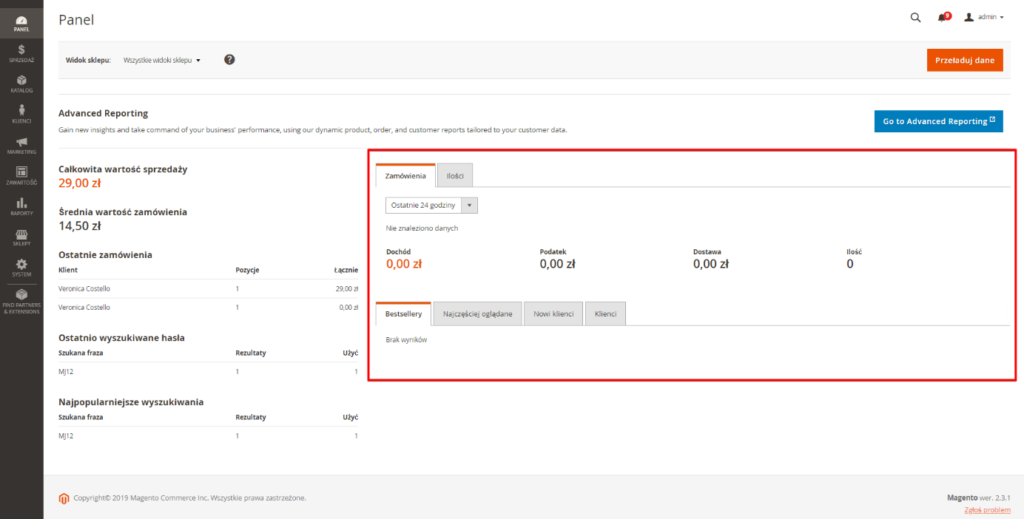
Adobe Commerce – business-oriented e-commerce engine, source: www.smartbees.p
Adobe Commerce (Magento) is an open-source platform created by users and developers community, taken over by Adobe in 2020. It’s a service provided by people to people, and that’s why its main version – Magento Open Source – is free. However, for business clients, there are two other options available: Magento Commerce (the cost depends on the income, but an average price starts from about 7 000 zł annually) and Magento Cloud which also offers hosting, a dedicated online cloud, and advanced technical support.
Magento will be the best choice for professional retailers with an extensive inventory and a thick wallet, mostly because of the platform’s unlimited storage volume as well as simple stock and offer management. If you’re just starting out with Magento yet want to build a professional online store, you may find and hire Magento developers to assist you. E-sellers should remember though that increasing and scaling their business means higher costs, so it’s not a solution for those on a budget.
Pros:
- free basic version,
- good SEO support,
- easy offer and inventory management,
- integrations with price comparison websites (e.x. Ceneo) and other e-commerce platforms (e.x. eBay),
- advance reporting and analysis.
Cons:
- no hosting option (apart from Magento Cloud),
- difficult setup that may require technical skills,
- not for beginners and small enterprises,
- changeable price.
Shops examples:
- 4care – https://4care.eu/nl/.
- Toolmach – https://www.toolmach.eu/ .
- Gardenowo – https://www.gardenowo.pl/ .
BigCommerce – not only for big retailers

BigCommerce – best platform for small and big companies, source: www.support.bigcommerce.com
Currently, BigCommerce is considered one of the best e-commerce platforms available that only e-commerce giants, like Shopify, may compete with. Similar to IdoSell, BigCommerce uses the Saas system and provides features such as shop creator, hosting options, and extensive marketing functionalities. Thanks to numerous integrations, BigCommerce may turn out to be an excellent tool for multichannel selling, using Amazon, eBay, Facebook, Pinterest, or Instagram.
The reason for BigCommerce becoming more and more popular is its universality – the platform works superbly with B2B and B2C clients, and the price is pretty reasonable – it starts from 29,95$/month. Unfortunately, if our income runs over 40 000$, we need to get a PRO version that costs as much as 299,95$/month.
Pros:
- hosting provided,
- full 24/7 technical support,
- implementation of various product options possible,
- developed omnichannel options.
Cons:
- individual customization is a bit harder compared to the other platforms,
- not the best choice for small entrepreneurs.
Shops examples:
- Rock Bottom Golf – www.rockbottomgolf.com.
- Mountain Rose Herbs – https://mountainroseherbs.com/.
- Star City Games – https://starcitygames.com/.
- Solo Stove – https://www.solostove.com/.
Shopify – easy start for beginners

Shopify – best e-commerce platform for beginners, source: www.khaoscontrol.com
Shopify – this Canadian platform has taken the present e-commerce market by storm. Its functionalities and advantages are undeniable. For sure a huge asset is the possibility to integrate both online and brick-and-mortar retail, and also manage the store via a mobile app.
What’s more, it’s a beginner and user-friendly platform where e-sellers may easily scale their business without the necessity to invest a huge amount of money in advanced tools or technologies. Also, to become successful with Shopify no technical knowledge is required. Therefore, it’s an excellent choice, especially for small and mid-sized companies, as well as individual e-sellers. Business clients, interested in detailed reports, analysis, and advanced inventory management, may find this platform short of the mark.
The cost hovers around 29$ to 299 $, depending on a chosen subscription, and transaction fees.
Pros:
- 14-day trial with no credit card needed,
- intuitive admin panel,
- perfect for individual retailers,
- multichannel sales option,
- hosting included.
Cons:
- a limited number of free templates,
- no advanced product customization,
- personalization may lead to additional costs,
- transaction fees charges.
Shops examples:
- Good as Gold – https://www.goodasgoldshop.com/.
- Skinny Teatox – https://skinny-teatox.com/.
- Chalkd – https://www.chalkd.co.nz/.
- Pop Chart – https://popchart.co/.
Wix Ecommerce – build a website and start your first online business
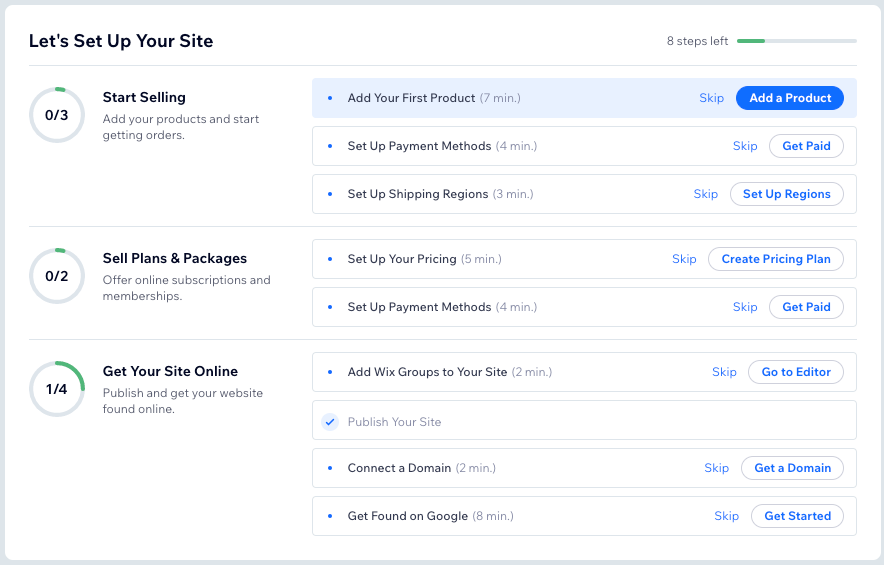
Wix Ecommerce – e-commerce services from Wix, source: www.wix.com
Wix is not only a more and more popular website builder but also an interesting e-commerce solutions provider. Its interface as well as a website building system is much simpler than WordPress. In other words – Wix doesn’t require any technical skills to create and manage a website. So what it looks like when it comes to running an online store?
Wix offers a large number of alluring templates for online shops that you can easily customize. All the features that you need to run an e-store are already pre-built in your template, so additional manual setup is not necessary. Therefore, Wix makes a good choice for beginners, especially individual retailers.
The cost hovers from 27$ to 59$, depending on a subscription (Basic, Unlimited, VIP).
Pros:
- low entry-level, no excessive budget or skills required,
- easy personalization,
- rich variety of free templates,
- Facebook, Instagram, and Amazon integrations,
- hosting provided.
Cons:
- limited storage space (20 GB) – not a good choice for high-quality digital products,
- no advanced automated features,
- low website and store speed when using free services,
- some functions cannot be fully customized or personalized.
Shops examples:
- Bensimon Boutique – https://en.bensimon.com/ .
- Amoodz – https://www.amoodz.com/ .
- The Original Tea Towel Co – https://www.originalteatowel.co.uk/.
- Aus Labs – https://www.auslabs.shop/ .
Zyro – the cheapest platform on the market
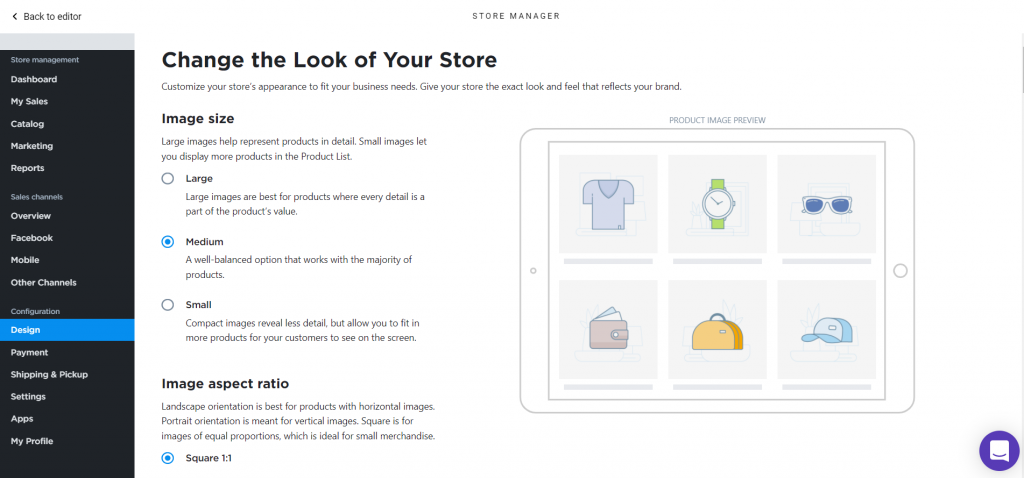
Zyro – cheap and fast e-commerce platform, source: www.hostinger.com
Zyro is another website builder that enables you to create and connect an online store to your website. Thanks to the advanced AI solutions and tools, creating and shop setup take only a moment. Apart from a free annual domain, Zyro also offers fast hosting, provided by Hostinger. It’s a huge advantage in comparison with a complicated WordPress or quite slow Wix.
Even though Zyro doesn’t give any trial period, users are guaranteed 30-day money back. However, it doesn’t seem to be necessary, especially since Zyro subscription prices start from 2,90$/month., and the most expensive plan costs 15.90$.
Pros:
- the cheapest platform on the market,
- fast hosting,
- perfect choice for beginners and individual sellers,
- full technical support 24/7,
- extremely easy page & shop customization, no technical knowledge required.
Cons:
- product limits ( max. 2500 for Premium subscribers),
- basic integrations only,
- transaction fees,
- online payments operated by Stripe only,
Shops examples:
- Surf Happy – https://erinchamp.com/surf-happy.
- Forrest – https://www.forrest.lt/.
- Notebook Therapy – https://notebooktherapy.com/.
- The Row Chocolate Shop – https://www.therawchocolateshop.com/.
PrestaShop – open-source for beginners
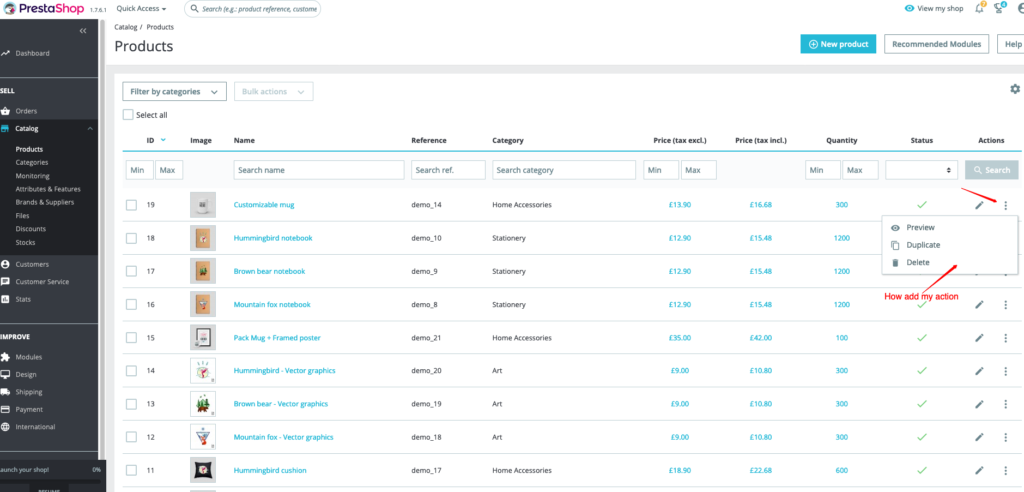
PrestaShop – open-source for everyone, source: www.prestashop.com
PrestaShop is the second open-source platform in our ranking. Unlike its competitor, Adobe Commerce, PrestaShop’s interface and management are much more user-friendly which makes this platform an excellent choice for beginning retailers that value the features of open-source solutions. Unfortunately, pre-built functionalities cannot compare to Magento’s offer, so professional entrepreneurs may be a bit disappointed.
Shop creation is also easy thanks to a great range of free templates which you can modify freely.
Platform usage is free of charge, but on the other hand – domain and hosting costs are yet to be paid by the user, as they are not provided by PrestaShop.
Pros:
- free open-source platform,
- supportive users and developers community,
- broad amount of free templates that you can easily modify,
- user-friendly admin panel.
Cons:
- some modules may be chargeable,
- no domain or hosting provided,
- limited business scale options,
- no official, technical support.
Shops examples:
- Decathlon – www.decathlon.pl .
- Footshop – footshop.eu .
- Monsieur Chaussure – www.monsieurchaussure.com .
- Only Hangers – https://www.onlyhangers.com/.
The best hosting providers for your shop
These days the majority of e-commerce platforms offer complex services, including professional technical support and hosting. Though some of them, like WooCommerce, still require plugging the user’s own domain and hosting platform.
Below we present the 5 best hosting providers for online shops.
- Hostinger – an affordable hosting service with a rich offer for small and mid-sized companies. Perfect match with Woocommerce, PrestaShop, and Adobe Commerce (Magento). Hostinger not only gives its clients free of charge domain names but also guarantees online safety with SSL certificates and regular back-ups. The service cost starts from 1,39$/month.
- BlueHost – WordPress users’ first choice. BlueHost gives access to an unlimited number of domains, page analytics, and offers unlimited storage space. Online payments are protected by SSL certificates, SSH, and Spam Assassin features. The price is only 2,95$/month.
- SiteGround – this is another hosting services provider recommended for WooCommerce clients. However, it will also perform with PrestaShop and Adobe Commerce (Magento). Its cost is a bit higher compared to the previous recommendations, as it starts from 6,99$/month. On the other hand, subscribers obtain free access to subdomains, a vast range of templates, and various personalization features. Data security is guaranteed by daily back-ups, PCI standards compliance, and full 24/7 technical support.
- DreamHost – as for beginning vendors with no previous e-commerce experience, DreamHost makes a choice. It’s an easy, intuitive platform, recommended especially for WooCommerce. The provider guarantees PCI standards compliance and a pre-built SSL certificate. Additional features include free migrations, 1-Click WordPress Install, and technical support. The monthly cost reaches 2,59$.
- InMotion Hosting – for those who look for a reliable and fast platform, InMotion may be the one. Automatic setup allows selling almost immediately. InMotion supports e-commerce platforms such as PrestaShop, Adobe Commerce, and WooCommerce. Though the users’ data is protected by daily back-ups, InMotion subscriptions do not comply with PCI standards which some users may consider a drawback. Pricing rates start from 6,99$/month.